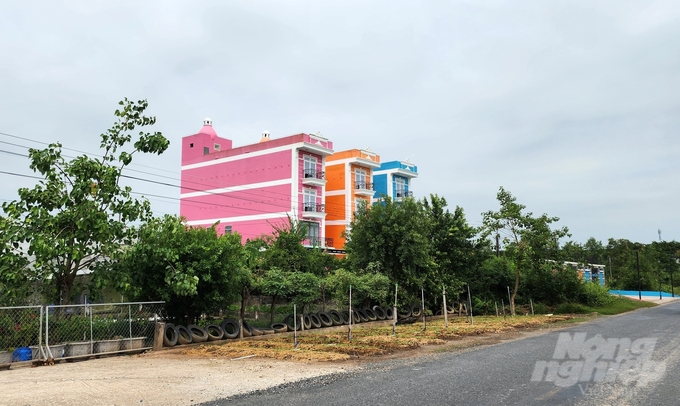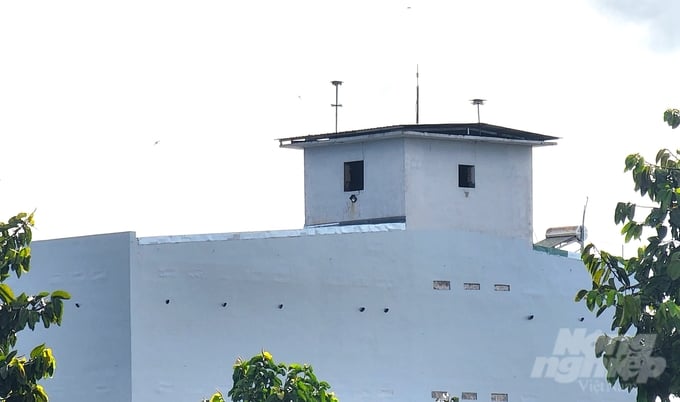May 29, 2025 | 15:37 GMT +7
May 29, 2025 | 15:37 GMT +7
Hotline: 0913.378.918
May 29, 2025 | 15:37 GMT +7
Hotline: 0913.378.918

Many large-scale swiftlet houses are invested in and clustered together in My Xuyen district, Soc Trang province. Photo: Kim Anh.
Since 2018, swiftlet farming has been acknowledged as a sector of livestock production. Following to that time, the swiftlet agricultural sector has experienced substantial growth in 42 out of 63 provinces and cities. As a result of the Mekong Delta's high economic value, a considerable number of families have invested significantly in the construction of large-scale swiftlet houses.
Clustered closely along Provincial Road 934, which passes through My Xuyen town, My Xuyen district, Soc Trang province, are vibrant swiftlet houses.
One of the homeowners stated that their swiftlet house, which covers approximately 280m2, produces an average of 2 to 4 kilograms of nests per month and has been in operation for over 15 years. At the moment, unprocessed swiftlet nests are valued at an average of 18 to 35 million VND/kilogram.
Meanwhile, during the farming process, people do not incur feeding costs, given that the swiftlets inhabit their natural habitat. As a result, producers realize substantial returns on their investments within a concise timeframe of one to two years.
Based on data from the Department of Livestock Production and Animal Health of Soc Trang province, the current count of swiftlet houses in the entire province stands at 814. This represents an approximate 85-house increase in comparison to the corresponding period last year. The swiftlet population in these houses has remained consistent over the years at over 281,000. The annual average produce of swiftlet nests is approximately 9 tons when measured with this scale.

Many businesses have boldly invested in machinery, technology, packaging, and branding for Soc Trang's swiftlet nest products. Photo: Kim Anh.
In the coastal region of Vinh Chau town, which is one of the two areas with a significant concentration of households involved in swiftlet farming, numerous enterprises have made audacious investments in machinery and technology to manufacture a diverse range of processed goods. These products, including pre-prepared swiftlet nests flavored with pandan leaf and cordyceps militaris mushroom, are among the many that have been recognized as 3-star OCOP products.
Vinh Chau town presents an estimated 1.7 tons of swiftlet nests to the market annually, of which 184 have been constructed by 160 households. In order to promote the sustainable development of swiftlet farming in alignment with local planning, the Economic Department of Vinh Chau town has been implementing measures to improve the administration of swiftlet house construction.
Concurrently, endeavors are undertaken to conserve the extant swiftlet populations, guarantee environmental security, and prevent the spread of diseases in regions designated for swiftlet cultivation. It is recommended that households implement scientific and technological progress in their manufacturing procedures so as to distinguish their products in terms of quality, packaging, and labeling.
In light of the alarming trend in illegal hunting and the depletion of swiftlet populations in certain regions across the country, the Provincial People's Committee of Soc Trang has been advised by the Department of Livestock and Veterinary of Soc Trang to develop strategies and enhance the implementation of anti-illegal hunting measures. Furthermore, there is an increased focus on providing information to households involved in swiftlet farming through the establishment of identification codes and swiftlet farming area codes, which serve to streamline management processes.

Every year, the Department of Livestock and Veterinary of Soc Trang province has organized surveys and conducted statistical analysis on the fluctuation of the total swiftlet population, ensuring favorable conditions for management. Photo: Kim Anh.
Mr. Lam Minh Hoang, Director of the Department of Livestock and Veterinary of the province of Soc Trang, added that in order to increase the export of swiftlet nests and safeguard the healthy development of swiftlet populations, the sector increases disease surveillance on swiftlets. The circulation of avian influenza viruses H5N1 and H5N6 within swiftlet populations is a matter of particular concern. Alone, 495 samples were gathered in 2023.
In addition, the sector conducts surveys and compiles statistics annually regarding fluctuations in total swiftlet populations, leading farms, breeding grounds, and nest extraction to assist individuals in comprehending and developing the farming profession sustainably.
Prior to this, on February 28, 2022, the People's Council of the province of Soc Trang issued Resolution N0.3, which regulated swiftlet farming zones and prohibited livestock farming zones within the province. Swiftlet agricultural regions are required to be situated beyond the geographic limits of local governments, wards, districts, and cities within the province. Moreover, swiftlet dwellings are required to be situated a minimum of 300 meters from the area's administrative boundaries.
Translated by Linh Linh

(VAN) FAO’s Director-General addresses the 5th Baghdad International Water Conference.
/2025/05/26/1716-4-nongnghiep-191706.jpg)
(VAN) Chain linkages, technological innovation, and raw material zoning are three strategic pillars for the coconut industry to strongly develop and elevate its position on the global agricultural map.
![Advanced mariculture – an inevitable trend: [4] Accompanied by scientists](https://t.ex-cdn.com/nongnghiepmoitruong.vn/608w/files/sohk/2025/05/13/1941-pgsts-vo-van-nha-140958_717.jpg)
(VAN) According to Assoc. Prof. Dr. Vo Van Nha, Director of the RIA III, the development of advanced offshore mariculture is no longer an option but an essential path for Vietnam’s fisheries sector.

(VAN) Vietnam is intensifying the development of mollusk farming areas that meet international standards, aiming for sustainable growth and enhancing its export position in the global seafood market.
![Advanced mariculture – an inevitable trend: [3] Policy-driven momentum](https://t.ex-cdn.com/nongnghiepmoitruong.vn/608w/files/doanhtq/2025/05/21/0104-0616-0348-nuoi-bien-170339_789.jpg)
(VAN) To ensure the success of offshore mariculture that uses advanced technologies, it is essential to establish supportive policies that inspire both individuals and enterprises to invest with confidence.
![Advanced mariculture – an inevitable trend: [2] Outstanding results](https://t.ex-cdn.com/nongnghiepmoitruong.vn/608w/files/sohk/2025/05/12/4632-4136-nuoi-bien-11-164117_819.jpg)
(VAN) Pilot models of high-tech offshore mariculture in Vietnam, particularly in the South Central Coast region, have demonstrated exceptional economic returns and sustainability, setting a new direction for the country’s aquaculture industry.
![Advanced mariculture – an inevitable trend: [1] Moving offshore](https://t.ex-cdn.com/nongnghiepmoitruong.vn/608w/files/phucpm/2025/05/18/0252-2436-nuoi-bien-6-162148_783.jpg)
(VAN) Mariculture using advanced technology and moving offshore is an inevitable trend, as nearshore areas increasingly reveal limitations.